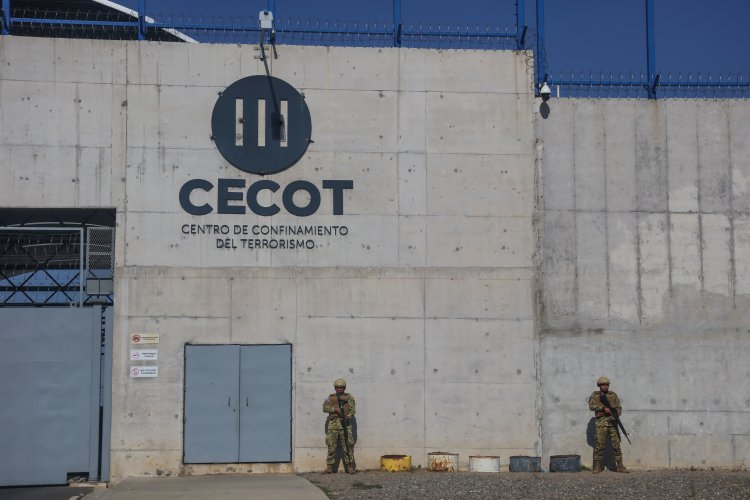Trump administration reports man mistakenly deported is residing in an El Salvador prison
The U.S. government has maintained its silence regarding any actions it may have taken to facilitate his return to the United States.

Michael Kozak, a senior State Department official, stated in a written declaration submitted to a judge under penalty of perjury, “He is alive and secure in that facility. He is detained pursuant to the sovereign, domestic authority of El Salvador.”
Kozak's submission was made shortly before Trump walked back comments he made a day earlier, where he hinted at the possibility of directing Abrego Garcia’s return to the U.S. if the Supreme Court ordered it. “These barbarians are now in the sole custody of El Salvador, a proud and sovereign Nation, and their future is up to President [Nayib Bukele] and his Government,” Trump wrote on Truth Social on Saturday evening. “They will never threaten or menace our Citizens again!”
During a conversation with reporters aboard Air Force One on Friday night, Trump seemed to suggest that the U.S. had the authority to demand Abrego Garcia’s return, and potentially those of over 200 other individuals deported to El Salvador in recent weeks. “If the Supreme Court said bring somebody back, I would do that. I respect the Supreme Court. … I have great respect for the Supreme Court,” the president remarked. “I’m not totally well versed as to the specific case, but if they said to bring him back, I would tell them to bring him back.”
Both Kozak's declaration and Trump’s social media post appeared to back up the administration’s legal argument that U.S. officials are not in a position to request Abrego Garcia's return. However, these statements did little to ease the growing tension between the administration and U.S. District Judge Paula Xinis. The minimal information provided by Kozak fell short of what Xinis demanded, as she had instructed the Trump administration to not only disclose Abrego Garcia’s whereabouts but also outline any actions taken to facilitate his return to the U.S.
Kozak submitted his update 10 minutes past a court-ordered deadline and included merely 49 words about Abrego Garcia's location, without addressing what actions officials had taken or planned to take to rectify their error. The administration has not disclosed any details to the court regarding the level of control the U.S. may have over individuals it has sent to the anti-terrorism prison, known as the Terrorism Confinement Center, in recent weeks. It is also uncertain if Kozak's concise declaration fulfills the judge's requirement for someone with “personal knowledge” of Abrego Garcia’s status. Kozak claimed his knowledge arose from “personal knowledge, reasonable inquiry, and information obtained from other State Department employees,” including unnamed personnel at the U.S. embassy in El Salvador.
Abrego Garcia’s situation has stirred national outrage after the Trump administration acknowledged that it had mistakenly deported him to El Salvador on March 15, violating a 2019 court order that prohibited his removal due to the risk of gang persecution. At the time of his deportation, Abrego Garcia was denied asylum but allowed to remain in Maryland, where he had been living with his U.S. citizen wife and children.
Judge Xinis, an appointee of former President Obama, had previously determined that the Trump administration was noncompliant with an earlier order mandating the provision of detailed information regarding Abrego Garcia by Friday afternoon. Consequently, she demanded continuous updates.
Moreover, Trump administration attorneys have become increasingly confrontational with Xinis following a Supreme Court ruling on Thursday that largely upheld her order requiring the government to facilitate Abrego Garcia’s return.
In response, Abrego Garcia’s legal team submitted their own documentation to Xinis on Saturday, urging her to initiate contempt proceedings and issue another order with clear directives for the administration to begin facilitating his return. They pointed out that Trump’s comments on Friday — especially as he prepares to host El Salvador’s President, Nayib Bukele, at the White House on Monday — suggested that the U.S. could facilitate Abrego Garcia's return. “Trump confirmed that the United States has the power to facilitate Abrego Garcia’s release from prison and return to the United States,” they asserted, requesting that the judge order the U.S. to arrange for his transportation from El Salvador and grant him immigration status that would enable his legal entry into the country.
Xinis has scheduled another hearing on this matter for Tuesday afternoon. Abrego Garcia’s lawyers have requested that the judge compel officials from the Justice Department, the Department of Homeland Security, and the State Department to appear at that hearing and provide testimony about Abrego Garcia’s situation and the requests the U.S. has made of the Salvadoran government regarding him.
Officials in the Trump administration have accused Abrego Garcia of being a member of the violent MS-13 gang. An immigration court judge concluded in 2019 that he likely was affiliated with the gang; however, Judge Xinis has noted that officials failed to present any credible evidence that would substantiate that conclusion.
Max Fischer for TROIB News












